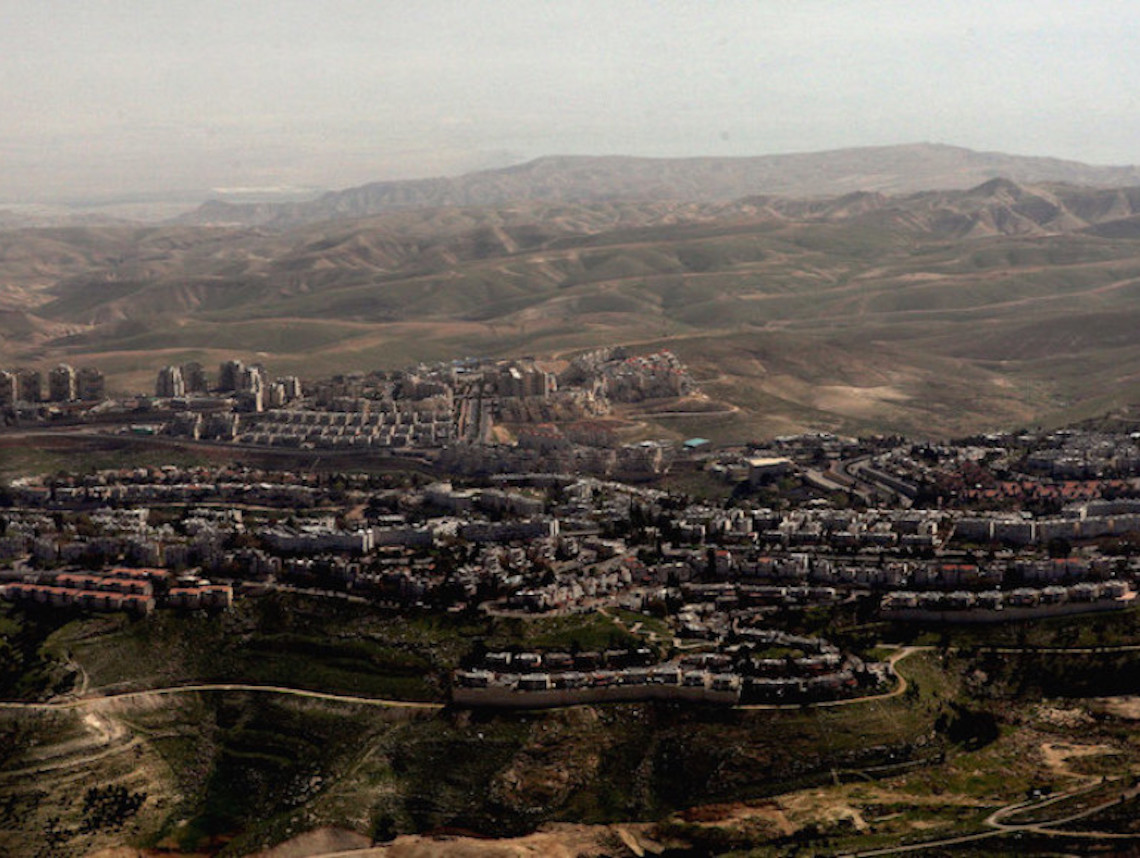 An aerial view of Israel’s largest settlement, Maale Adumim, March 12, 2008. Photo by David Silverman/Getty Images.
An aerial view of Israel’s largest settlement, Maale Adumim, March 12, 2008. Photo by David Silverman/Getty Images. Over the weekend, The New York Times ran an opinion piece by Palestinian lawyer-writer-activist Raja Shehada decrying Israeli policies on the freedom of movement by West Bank residents like him. Anyone even a little familiar with Israeli life who reads it closely will reject two complaints in particular as completely bogus.
First, in a paragraph The Times also used as a sub-head, he bemoaned:
I was going to London for a week, and my flight was at 5 in the afternoon. Twenty years ago, the drive took 50 minutes. Now, with so many checkpoints on the way, I left the house at noon, five hours before the flight. (Emphasis added.)
The paragraph suggests the commute now took five hours instead of one, and the sneaky use of the numbers 5 and 50 might even lead a casual reader to conclude Israelis had made Palestinian travel to the airport ten times as long (ever since the start of the present round of anti-Jewish violence).
Clever malarkey is still malarkey. Anyone who has flown out of Ben Gurion Airport even once knows that tight security for all passengers requires arriving at least three hours before a flight. So if Shehada left the house at noon, his commute to the airport was only about two hours, not five.
Americans can spend more time commuting to JFK or O’Hare, and in fact Israelis living in Haifa and Tiberias can, too. A two-hour commute to the airport!
Boo hoo.
The 1,500-word essay (well over twice the size of a typical op-ed) bewails the travails of Shehada’s two-hour ride to the airport (soldiers signaling he can pass, children begging for money, “getting lost in your own country”) yet he fails to mention even once the reason Israelis have expanded checkpoints and road closures: Palestinian violence. For him, it’s all about Israeli discrimination.
But Israel isn’t complicating life for Palestinians because it hates Palestinians. It’s responding to the fact most terrorists who have killed Israeli Jews are Palestinian. Israel hasn’t cracked down on Mormons or dentists – or Israel’s minority Druze, ethnically related to Arabs but loyal to the State. If Palestinian violence disappeared, the checkpoints would dissolve.
Terrorism inconveniences everyone. Since the September 11 attacks, Americans have faced increasingly longer lines at airports. Heck, for eleven years we’ve been following intricate rules about liquids to avert a purely theoretical terrorist threat. And American security rules apply to people who are not terrorists, who have never been terrorists, and have completely innocent reasons for flying. Again, though, if terrorism went away, flying would be a breeze.
In his other bit of slight-of-hand, Shehada dramatically described donning his glasses to make out a West Bank border sign reading “This crossing is reserved only for Israelis.” He hastened to add the text specified that it was “including, in fine print, those entitled under the Law of Return of 1950” – i.e., Jews.
But including Jews doesn’t exclude other Israelis, like the country’s 1.6 million Arab citizens. Shehada could not mention their existence, of course, without undermining his “Israel is racist” tone.
The most shocking thing about the essay, though, is the casual, sympathetic way Shehada evokes what appears to be ethnic cleansing. He quotes a cab driver:
I’m so tired of Jerusalem. All its people are bad and don’t deserve this great city. The whole lot should all be evacuated and the city handed over to an international power. Then whoever wants to visit to pray there could use the houses of the former inhabitants, now turned into hotels.
Nowhere does the driver say Jerusalem’s Arabs as well as Jews should be expelled, nor that Jews as well as Arabs should be welcome to visit and pray. In the context of an essay without a single word of criticism for Arabs that had yet to say a single kind word about Jews, the implication is clear.
Well, it’s only an opinion piece, right? But The Times reviews thousands of opinion pieces a year, including dozens or hundreds about the Middle East. It chose one with that shocking paragraph that also obscured two key facts in a clear attempt to deceive.
Did no Israel-based staff look at the piece? Even if the “Editorial Wall” prevented participation by Times reporters and editors, anyone living in Jerusalem or Tel Aviv – indeed anyone with a basic familiarity with Israeli culture – would have known about Arab Israelis and the airport’s rules. And frankly, once the trickery was identified, the whole essay should have been scrapped.
Hopefully Israel can soon facilitate freer movement for everyone living within its borders. But the Jewish state isn’t solely responsible for the congestion. Palestinians themselves play a part – as does, sometimes, the media.
David Benkof is a columnist for The Daily Caller, where this essay first appeared. Follow him on Twitter (@DavidBenkof) and Muckrack.com/DavidBenkof, or E-mail him at DavidBenkof@gmail.com.






















 More news and opinions than at a Shabbat dinner, right in your inbox.
More news and opinions than at a Shabbat dinner, right in your inbox.